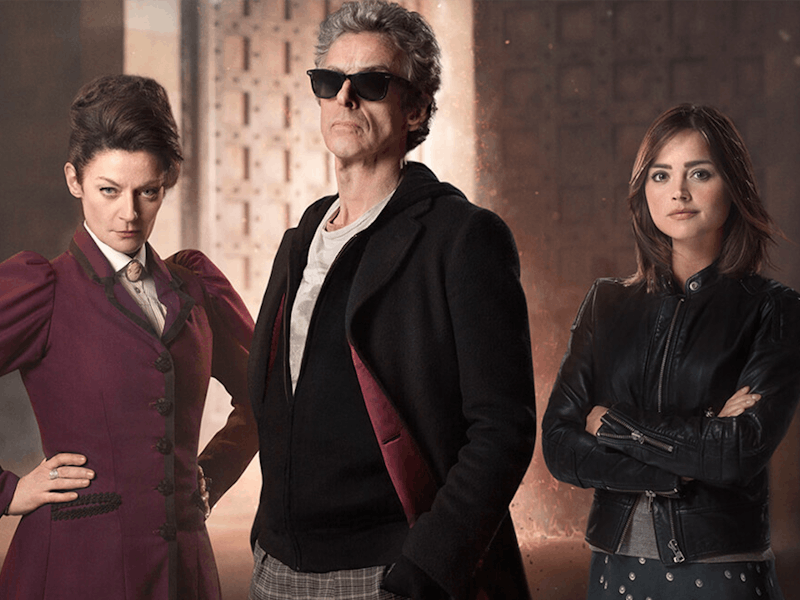Clara's Evolution Shows 'Doctor Who' May Have Finally Discovered Women
The show's has long relegated women to companion roles. But a shift is clearly underway.

One of the main criticisms levied at the rebooted version of Dr. Who has been the writers’ treatment of women characters. As capable as women are portrayed, they are almost without exception defined by their proximity to men. Steven Moffat has often (and deservedly) been accused of pretty much delighting in pissing off fans and critics alike with rampant sexism.
That isn’t to say that all of the companions don’t play important roles in the story: especially in the show’s reboot, the companions are a crucial part of the show, and have left indelible marks on the Dr. Who canon overall. But while the women characters in the reboot are perhaps portrayed as “stronger” than the companions in the original run, they have still been more or less the Doctor’s Ladies.
In the Davies/Moffat era, there was a shift to “companion as potential love interest” where one of the recurring subplots was the dashing young Doctor competing over the companion’s attention and interest with the often frustrated and outmatched boyfriend: Billie Piper and Mickey, Amy Pond and Rory, and Clara and Danny Pink all had elements of “who gets the girl” even with Matt Smith’s Doctor having a much more paternal relationship with Amy. It adds to the drama of the show, but let’s be honest, a lot of the time it came across as possessive and downright creepy.
Martha Jones went from medical doctor to UNIT commander to post-apocalyptic revolutionary, but a main part of her storyline was her unrequited love for the Doctor, who was still on the rebound from Rose. River Song, an archeologist and universally feared outlaw, was still specifically the Doctor’s Wife; she became a time and space traveling, take-no-shit badass solely to track the Doctor down. Catherine Tate’s Donna Noble was never a love interest but instead got the middle-aged spinster “when will she ever get married” comic relief treatment. Donna Noble almost single-handedly saved the entire universe by become a demi-Time Lord, but it quite literally broke her brain.
But however slowly and subtly, the show seems to be changing.
There can be no doubt Clara still acts as the increasingly alien Doctor’s human anchor, but Clara challenges the Doctor in the way that other companions have not; Rose, Martha, Donna, Amy, and even River Song to a certain point defied the Doctor, but it was almost always in the context of disobeying.
In the aftermath of Danny Pink, Capaldi’s Doctor still pushes the paternal “duty of care” narrative with Clara, but we find Clara heartily dismissing that notion. By the end of Season 8, after it had been determined that Clara’s final season would not include a “love interest,” we find Clara has become more or less of an equal, a partner rather than subordinate.
Even the women characters in the supporting cast seem to be getting a much stronger, deeper character treatment. Michelle Gomez’s regenerated Missy character is by far the best thing to happen to the series since Tom Baker’s scarf. And while of course her role is certainly relational to the Doctor, she is not a romantic foil, but a counterpart, the proverbial ying to the Doctor’s yang.
Whether Maisie Williams’ Ashildr character who debuted in last week’s The Girl Who Died ends up being an ally or villain (from the previews, most probably both) it’s clear that Ashildr is a thoughtfully developed character. It’s not likely that she’ll stay on as a regular cast member, but her story arc is shaping up to be the best of the season so far.
With the new cast additions and the hiring of two women writers (that makes a grand total of six in more than 50 years of Dr. Who history), it seems like the show runners are finally committed to bringing some diversity behind and in front of the camera. That isn’t to say that men can’t write complex women characters, but till now the dudes writing Dr. Who haven’t done the best job of it.
So is this Moffat finally trying to appease fans and critics, or is there something bigger in the works? I sincerely hope this is more than a token attempt; the evolution of the women characters has been the bright spot in an otherwise pedestrian season. And with the show struggling for ratings, perhaps this newfound commitment to diversity will clear the way for the Doctor going with a Missy-style gender upgrade?
With Clara’s exit being confirmed and the rumors of Capaldi not sticking around for another season, we may well be approaching the moment when we introduce the first woman as the Doctor. Hayley Atwell has been petitioning for the role, but there are no shortages of actresses who would be stellar. If Moffat continues to stay out of his own way, the addition of more diverse and complex women characters, including the Doctor, would be great for diversity, not to mention rejuvenating the franchise.